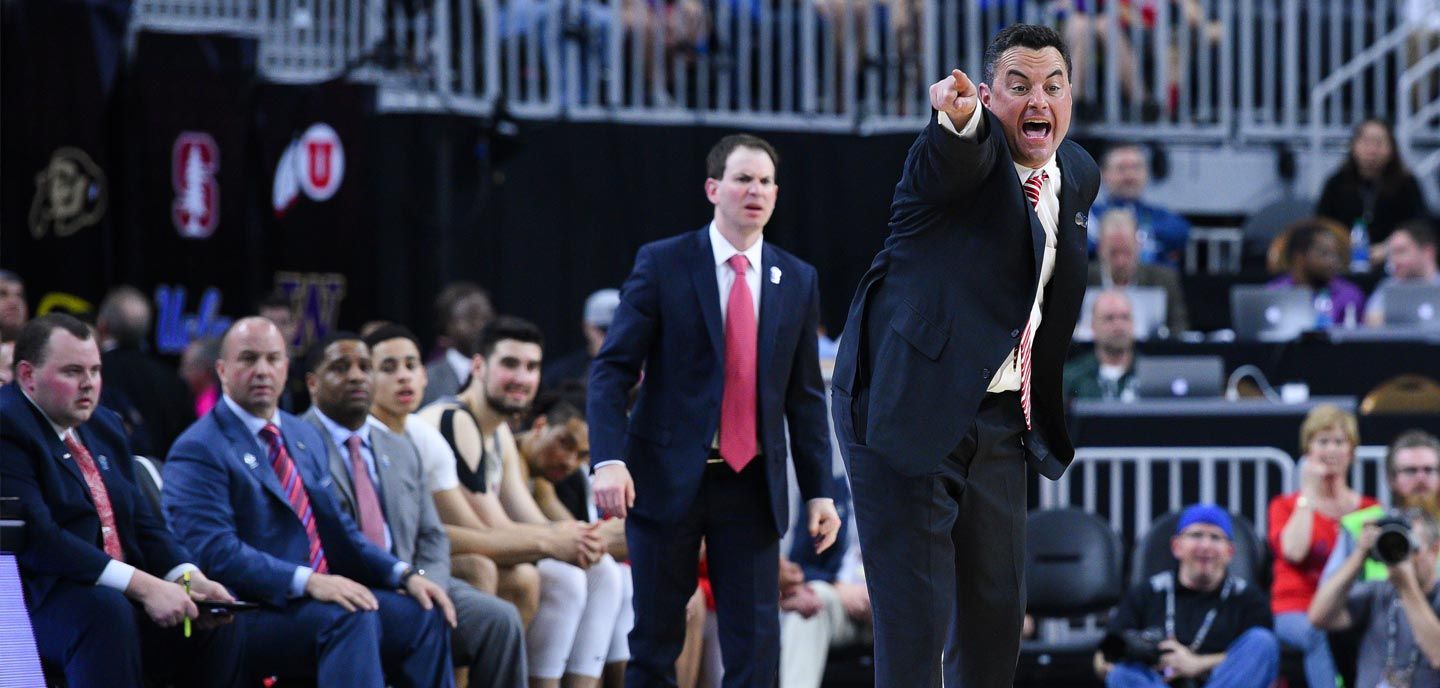It must have felt good in the moment.
When Arizona coach Sean Miller called a timeout with :09 seconds left in the Wildcats Pac-12 semi-final game against UCLA—a game they led by 11 points—you could see at least one assistant coach licking his lips with joy while looking across at the UCLA coaches and team already lined up waiting to shake hands.
Who doesn’t love a moment of well-planned revenge?
Players and coaches alike huddled together to celebrate not just the victory on the scoreboard, but the delight in getting back, the satisfaction of returning one perceived slight with another.
Miller’s act was obvious retaliation for a timeout called by UCLA coach Steven Alford in similar circumstances only weeks before, as Arizona was losing to their rival in front of the home crowd on Senior Night.
“Revenge is a dish best served cold.” Indeed, perhaps the wait only enhanced the intoxicating feeling so evident on the Arizona bench and in the satisfied crowd during the awkward timeout.
As expected, commentators disagreed as to the appropriateness of Miller’s move. Some applauded his action as a positive recruiting ploy and for communicating that he’s got his players’ backs, while others saw it as petty spitefulness put on display for the world to see.
While arguments can be made for both, I find myself decidedly against the action because as delicious as revenge may feel in the moment, it always creates larger problems in the end.
Revenge appeals to our lowest instincts
To “take the high road” means simply doing the next right thing. It means going against the base impulses of our nature and returning good for evil, blessing for insult, doing what’s right instead of what might be deserved.
Get our "Top Articles" sent to your inbox weekly.
To get up “higher” demands some effort. It requires restraint. A willingness to deny what the Bible calls our flesh.
The masses crying for blood are simply giving in to the darkside of human instinct (the easy choice) while someone resisting this urge must scratch and claw their way upward and away from their default response (the harder choice).
Isn’t it strange how one act of evil usually gives birth to more? One act of revenge operates like a cesspool of multiplying germs or the splitting of an atom, triggering a reaction of more and more of the same and worse.
Revenge isn’t what we want for our kids
How do we explain the end-of-game time out to our kids watching with us? What should we teach a generation of kids we’re coaching about moments like this?
Interestingly, hours after the game had finished, my own 6-year-old son tripped and pushed down my 11-year-old son. When getting the details, his main argument to me consisted simply of this: “He did it to me first.”
What do I say? “Good son! If he did it first then he had it coming. You should have kicked him in the chest once he was down to emphasize the point.”
Better still: “Bad move. You should have waited a week or two and snuck up and blasted him. He wouldn’t forget that!”
Of course, I struggled with wanting to say some version of those, because my flesh enjoys revenge, too. Plenty of us grew up in homes where that response was not only encouraged but celebrated.
But an accumulation of those small, seemingly inconsequential acts makes the world a horrible, spiteful place to live in. It’s not the right response, even if it seems to make sense and feels good in the moment.
Intuitively, I know the chaos created in the lives of those characterized by revenge, and I don’t want that for my kids.
Revenge never ends well
Think Hatfields and McCoys.
Jets and Sharks. Tupaq and Biggie. Hutu and Tutsi. Montague and Capulet. Corleone and Sollozzo/Barzini.
Where does it end?
If I am a UCLA underclassmen, and I apply the same logic we saw displayed in this game—and the logic applied in each of the real/fictional rivalries listed above—I am practically obligated to strike back. Next time we meet, I’m taking someone out.
In keeping with the logic, if I’m found to have stepped aside and fail to retaliate, I am weak. Soft. Unwilling to stand up for my side, my colors, my family.
If we appeal to a need for exacting revenge on behalf of Arizona’s lone senior and the spite felt in Tucson after Alford’s late timeout on Senior Night, what do the UCLA underclassmen owe their own spited teammates after this last episode?
It doesn’t end until someone gets hurt—sometimes tragically—and then everyone looks around and says, “How did we let it come to this? How did we get here?”
Easy. We kept planting the seeds of revenge, and now we’re eating its fruit.
Jesus’ radical response
I don’t know anything about the coaches of these teams, and I’m not trying to make a point directly about them or their character. What we saw on display at the end of that game is simply a view of competitive culture unrestrained by the Spirit of God.
Acts of revenge originate in this-world morality instead of other-worldly virtue. It’s what anyone wants to do short of being transformed—and we know that sometimes even transformation fails to restrain the desire and choice to enact revenge.
But can we prescribe a path for the Christ-following competitor facing similar circumstances?
Decades ago Muhammed Ali summarized the worldly spirit when he said, “I’m a fighter. I believe in the eye-for-an-eye business. I’m no cheek turner. I got no respect for a man who won’t hit back. You kill my dog, you better hide your cat.”
That’s non-gospel. Bad news.
But Jesus—faced with far more trying and unjust circumstances throughout His life—did the exact opposite. He had every right to fight back against the many spiteful end-of-game “timeouts” being thrown His way, but He always chose higher ground.
“For to this you have been called, because Christ also suffered for you, leaving you an example, so that you might follow in his steps. He committed no sin, neither was deceit found in his mouth. When they hurled insults at him, he did not retaliate; when he suffered, he made no threats. Instead, he entrusted himself to him who judges justly” (I Peter 1:21-23).
Elsewhere, Christ-followers are encouraged to leave room for God to be the avenger when we perceive that others have wronged us. “Beloved, never avenge yourselves, but leave it to the wrath of God, for it is written, ‘Vengeance is mine, I will repay,’ says the Lord.”
It’s not an ethic of weakness, but of strength. Not an appeal to the easy road of retaliation, but of subduing pride and leaving room for God to work out what He considers justice in His own time.
For Christ-followers, if you’re coaching/playing/cheering on the winning side of the Arizona/UCLA Pac-12 semi-final game, there’s only one right option: let the game end, take your win, move on.
You can be super competitive and still operate with a Kingdom ethic guiding you in moments like this. Win the game, forget the revenge, honor God.
Following in His steps makes the choice easy to see, but still hard to do. Entrust yourself to Him when tempted to exact your own revenge, and let His will be done on earth as it is in heaven.














